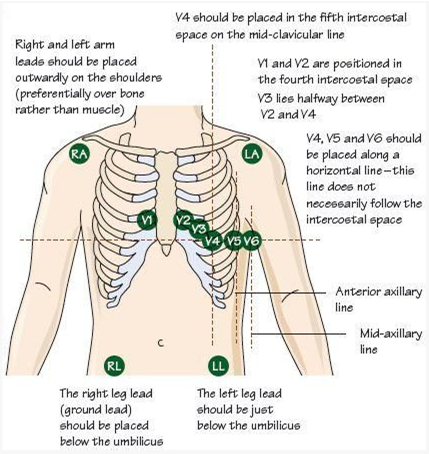The nurse is performing a 12-lead ECG on a male client with abundant chest hair. What is the most appropriate nursing intervention to improve adhesion of the ECG leads?
Use alcohol swabs to clean the skin before applying the leads
Clip the chest hair with the patient's permission before applying the leads
Apply the leads to the arms and legs only
Reschedule the ECG
The Correct Answer is B
The most appropriate nursing intervention to improve adhesion of the ECG leads on a male client with abundant chest hair is to clip the chest hair with the patient's permission before applying the leads. Chest hair can interfere with the adhesion of the ECG leads, resulting in poor signal quality and potentially affecting the accuracy of the ECG recording. By clipping the chest hair, the nurse can improve the contact between the skin and the ECG leads, allowing for better adhesion and signal transmission.
It is important to obtain the patient's permission before clipping the chest hair to respect their autonomy and ensure their comfort during the procedure. The nurse should explain the reason for clipping the hair and address any concerns or questions the patient may have.
Let's review the other options and explain why they are not the most appropriate interventions:
Using alcohol swabs to clean the skin before applying the leads: While cleaning the skin with alcohol swabs is a routine practice to remove oils and dirt that can affect adhesion, it may not be sufficient in the presence of abundant chest hair. Clipping the hair would be more effective in this situation.
Applying the leads to the arms and legs only: This option would not provide an accurate 12-lead ECG recording, as the chest leads are essential for evaluating the electrical activity of the heart from different angles. It is important to have the leads properly placed on the chest for an accurate assessment.
Rescheduling the ECG: Unless there are other valid reasons for rescheduling, such as a medical condition that contraindicates the procedure, rescheduling solely due to abundant chest hair would be unnecessary. Clipping the hair is a practical and effective solution to improve adhesion.

Nursing Test Bank
Naxlex Comprehensive Predictor Exams
Related Questions
Correct Answer is C
Explanation
Enalapril (Vasotec) is an angiotensin-converting enzyme (ACE) inhibitor medication commonly used to treat hypertension. One of the potential side effects of ACE inhibitors is hyperkalemia, which is an elevated level of potassium in the blood. Therefore, it is generally recommended for patients taking ACE inhibitors to avoid excessive intake of high-potassium foods.
The charge nurse should intervene because advising the client to increase their dietary intake of high-potassium foods contradicts the precautions associated with taking enalapril. Consuming high-potassium foods while taking this medication can potentially lead to an increased risk of hyperkalemia, which can have serious health consequences.
Let's review the other statements made by the nurse:
"Make an appointment with the dietitian for teaching": This is an appropriate statement as it encourages the client to seek professional guidance on dietary management of hypertension. A dietitian can provide valuable information on healthy eating habits and strategies to reduce blood pressure.
"Check your blood pressure at home at least once a day": This is also an appropriate statement as it promotes self-monitoring of blood pressure, which is important for clients with hypertension. Regular monitoring helps the client track their progress and detect any changes that may require medical attention.
"Move slowly when moving from lying to sitting to standing": This is a correct statement as it advises the client to practice orthostatic precautions. ACE inhibitors, including enalapril, can cause orthostatic hypotension, a drop in blood pressure upon standing. Moving slowly can help prevent dizziness and falls.
Correct Answer is C
Explanation
Maintaining a 2 gram-sodium (salt) diet is an important aspect of managing hypertension. High sodium intake can contribute to elevated blood pressure. Therefore, reducing sodium intake is recommended to help control blood pressure levels. The nurse should provide guidance on reading food labels, avoiding high-sodium processed foods, and incorporating a diet rich in fruits, vegetables, and whole grains.
The other options listed are not appropriate or beneficial for managing hypertension:
Maintaining a low-potassium diet: Potassium is an essential mineral that helps regulate blood pressure. While specific potassium restrictions may be necessary for some individuals with certain medical conditions, most people with hypertension do not need to limit their potassium intake. In fact, a balanced diet with adequate potassium is generally recommended.
Skipping a medication dose if dizziness occurs: It is not advisable to skip medication doses without consulting a healthcare provider. Hypertension medications are prescribed to help control blood pressure, and missing doses can lead to uncontrolled hypertension and potential complications. If the client experiences dizziness or other side effects from the medication, they should consult their healthcare provider for appropriate management.
Drinking three glasses of wine a day: Excessive alcohol consumption can contribute to elevated blood pressure. The recommended alcohol intake for individuals with hypertension is moderate or limited to moderate levels, which typically means no more than one drink per day for women and two drinks per day for men. Drinking excessive amounts of wine or any alcoholic beverage can negatively affect blood pressure control.
Whether you are a student looking to ace your exams or a practicing nurse seeking to enhance your expertise , our nursing education contents will empower you with the confidence and competence to make a difference in the lives of patients and become a respected leader in the healthcare field.
Visit Naxlex, invest in your future and unlock endless possibilities with our unparalleled nursing education contents today
Report Wrong Answer on the Current Question
Do you disagree with the answer? If yes, what is your expected answer? Explain.
Kindly be descriptive with the issue you are facing.
